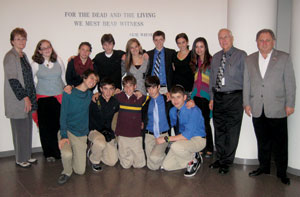Beit Shemeshites aren’t the only ones getting spat on
In a talkback on the report of eight-year-old Naama Margolese getting spat on and called a whore on her way to school in Beit Shemesh for not being dressed what the ultra-Orthodox deem modestly, talkbacker Eleanor says: “This group (the rabbis) must be stopped.” (“Israeli city braces for 10,000-strong protest against exclusion of women, Haaretz.com, Dec. 27, 2011)
Eleanor, unfortunately the “rabbis” will not voluntarily stop. Instead, the police must go, i.e., do their jobs as public servants. Law enforcement and swift crackdown is the only response that will bring the desired results. Not only are the rabbis not going to cede their power, but the perps may not even be taking orders from “above.” I hate to say it, because it’s such an oft-used cliche about another minority, but if the shoe fits, wear it: The only language they understand is that of (police) force.
Does not anyone see the irony in the second paragraph of the article? The protest march venue was moved after Haredim threatened violence if it was held at Orot Banot? Excuse me? So let’s get this straight: The thugs succeeded in moving the March Against Thuggery by threatening to use violence if their demands aren’t met. Yoo-hoo! Police: Anybody there? Aren’t you the ones who are armed and trained in crowd control, and if necessary, arrest those who commit violence? You certainly had no compunction about doing so in October 2000 against Arabs, did you?
And why does Haaretz insist on describing Naama Margolese as “religiously observant?” What does her level of observance matter? No 8-year-old, or 80-year-old, or anyone of any age or level of observance, of any faith or denomination, should have to undergo bullying anywhere, certainly not on her way to school.
When will we, and the legislature, press, police and other institutions, call a spade a spade? This is bullying, it’s harassment, and it’s assault, all of which we have laws against. Police: enforce, for God’s sake! Today it’s “just” the ultra-Orthodox spitting on the Orthodox; tomorrow it’s the ultra-Orthodox spitting on us all.
Sidebar: My daughter’s youth movement winter camp joined the protest, for which I’m proud. Since the protest was hastily organized only after the camp began, the camp organizers had to go into action quickly and get all the parents’ permission for the kids to protest. I of course gave mine, along with my blessing, but not all the parents did. I’d like to ask those parents two questions:
Where are your kids supposed to learn solidarity with the downtrodden and social activism if not in their youth movement? Where are they supposed to learn about rights, and not letting terror win out, if not from us, their parents?
If you think your neighborhood is safe, that this outrageous behavior is confined to Beit Shemesh (where we, the “enlightened” don’t live), you’re in denial. The Haredim are spreading, and with them their vigilante rule — Coming Soon to a Nice Suburb Near You.
I confess, I was a little scared; I reminded the counselors to watch out for our kids, and I trust them to, although I don’t expect them to hover. But it’s times like these when I remind myself that Tzviya Lubetkin was only 14 when she crawled through the sewers beneath the Warsaw Ghetto to evade the Nazis while delivering arms to the ghetto fighters. I’m not being melodramatic; obviously I’m grateful that my children are spared such scenarios, likely thanks in part to the Tzviya Lubetkins. The point is that if young people during the Holocaust wittingly placed themselves in danger in order to fight for their freedom, then surely we should encourage our kids to take slight, what are really negligible risks, in order to speak out against injustice, should we not?
Yam Erez, formerly Miriam Reiz, is a Kansas City native now residing in Ketura, Israel.



 What are monsters? In storybooks they frequently emerge as strong, wicked, mysterious beings whose purpose is to do harm. In movies, they sometimes look like huge, frightening creatures dripping with venom. In real life, monsters appear as … Oh, wait. They don’t. When we’re young, we’re taught that monsters exist only in stories and fairytales. And, of course, it’s not logical to fear something that isn’t real. I grew up believing that monsters live only where they belong, in books and myths. My experiences as a participant in the Together We Remember program, turned that notion upside down. What I learned is that monsters can in fact become a very real threat to humanity.
What are monsters? In storybooks they frequently emerge as strong, wicked, mysterious beings whose purpose is to do harm. In movies, they sometimes look like huge, frightening creatures dripping with venom. In real life, monsters appear as … Oh, wait. They don’t. When we’re young, we’re taught that monsters exist only in stories and fairytales. And, of course, it’s not logical to fear something that isn’t real. I grew up believing that monsters live only where they belong, in books and myths. My experiences as a participant in the Together We Remember program, turned that notion upside down. What I learned is that monsters can in fact become a very real threat to humanity. “I go to Grandma and Grandpa Brown’s for Christmas, help trim the tree, sing carols and then get a lot of presents. And then we go to Grandma and Grandpa Friedman’s to light the Chanukah candles, bake Chanukah cookies and get presents for eight nights,” bragged Josh Solomon, age 6, of New York City to one of his first-grade friends. “That’s not fair,” his friend responded, “I only get presents on one day.”
“I go to Grandma and Grandpa Brown’s for Christmas, help trim the tree, sing carols and then get a lot of presents. And then we go to Grandma and Grandpa Friedman’s to light the Chanukah candles, bake Chanukah cookies and get presents for eight nights,” bragged Josh Solomon, age 6, of New York City to one of his first-grade friends. “That’s not fair,” his friend responded, “I only get presents on one day.”